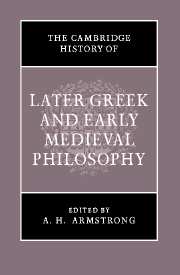Book contents
- Frontmatter
- Chapter 1 Introductory
- Part 1 GREEK PHILOSOPHY FROM PLATO TO PLOTINUS
- Part II PHILO AND THE BEGINNINGS OF CHRISTIAN THOUGHT
- Part III PLOTINUS
- Part IV THE LATER NEOPLATONISTS
- Part V MARIUS VICTORINUS AND AUGUSTINE
- Part VI THE GREEK CHRISTIAN PLATONIST TRADITION FROM THE CAPPADOCIANS TO MAXIMUS AND ERIUGENA
- Part VII WESTERN CHRISTIAN THOUGHT FROM BOETHIUS TO ANSELM
- Chapter 35 Boethius and the legacy of antiquity
- Chapter 36 Development of thought in the Carolingian Empire
- Chapter 37 The debate on philosophical learning during the transition period (900–1080)
- Chapter 38 Anselm of Canterbury: the philosophical interpretation of faith
- Part VIII EARLY ISLAMIC PHILOSOPHY
- Select Bibliography
- Additional Notes and Bibliography
- Index of ancient and medieval works referred to in the text
- General Index
- Index of Greek terms
- References
Chapter 37 - The debate on philosophical learning during the transition period (900–1080)
from Part VII - WESTERN CHRISTIAN THOUGHT FROM BOETHIUS TO ANSELM
Published online by Cambridge University Press: 28 March 2008
- Frontmatter
- Chapter 1 Introductory
- Part 1 GREEK PHILOSOPHY FROM PLATO TO PLOTINUS
- Part II PHILO AND THE BEGINNINGS OF CHRISTIAN THOUGHT
- Part III PLOTINUS
- Part IV THE LATER NEOPLATONISTS
- Part V MARIUS VICTORINUS AND AUGUSTINE
- Part VI THE GREEK CHRISTIAN PLATONIST TRADITION FROM THE CAPPADOCIANS TO MAXIMUS AND ERIUGENA
- Part VII WESTERN CHRISTIAN THOUGHT FROM BOETHIUS TO ANSELM
- Chapter 35 Boethius and the legacy of antiquity
- Chapter 36 Development of thought in the Carolingian Empire
- Chapter 37 The debate on philosophical learning during the transition period (900–1080)
- Chapter 38 Anselm of Canterbury: the philosophical interpretation of faith
- Part VIII EARLY ISLAMIC PHILOSOPHY
- Select Bibliography
- Additional Notes and Bibliography
- Index of ancient and medieval works referred to in the text
- General Index
- Index of Greek terms
- References
Summary
The discussion on the character of Boethius: Platonic or Christian philosopher?
The impetus given to speculative thought by the existence of a court interested in intellectual activities petered out with the beginning of the tenth century. The invasions destroyed a good deal of the economic presuppositions on which centres of learning had to rely, and interrupted their lines of communication. There is good reason for the name of the ‘Dark Age’ given to the decades which followed the end of Carolingian civilization. While the importance and influence of the French monarchy was reduced by the rise of feudal principalities, and remained so during this period, after 950 the Ottoman dynasty were capable of re-establishing monarchical power in Germany and of reviving literary activities as the true heirs of Charlemagne. Under their rule Latin writing in prose and verse was cultivated in those Saxon lands where Christianity had been introduced only a few generations earlier. But their court never reached such importance as a forum where speculative questions were debated as had distinguished the circle of scholars round Charlemagne and his grandson. Single centres in West and Central Europe kept up a certain continuity of philosophical learning. In some monasteries and cathedrals the libraries, collected under the impulse of the Carolingian revival, were preserved, and so the tradition of study, linked to the keeping and copying of manuscripts, remained alive. Some of these books, handed on from antiquity, raised disturbing questions about the relationship of rational thought to Christian revelation in the mind of the monk or canon who read them.
- Type
- Chapter
- Information
- Publisher: Cambridge University PressPrint publication year: 1967



